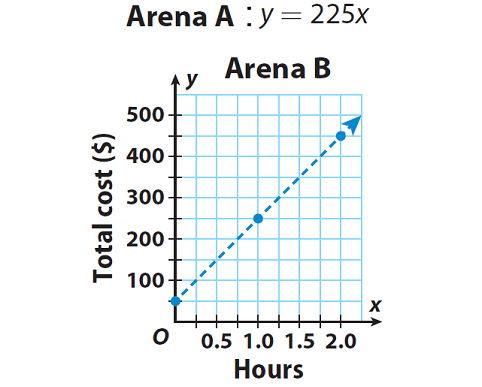COMPARING PROPORTIONAL AND NONPROPORTIONAL SITUATIONS
Subscribe to our ▶️ YouTube channel 🔴 for the latest videos, updates, and tips.
We can use what we have learned about proportional and non-proportional relationships to compare similar real-world situations that are given using different representations.
Example 1 :
A laser tag league has the choice of two arenas for a tournament. In both cases, x is the number of hours and y is the total charge. Compare and contrast these two situations.

Solution :
Arena A :
Arena A’s equation has the form y = mx + b, where b = 0. So, Arena A’s charges are a proportional relationship. The hourly rate, $225, is greater than Arena B’s, but there is no additional fee.
Arena A :
Arena B’s graph is a line that does not include the origin. So, Arena B’s charges are a non-proportional relationship. Arena B has a $50 initial fee but its hourly rate, $200, is lower.
Example 2 :
Jessika is remodeling and has the choice of two painters. In both cases, x is the number of hours and y is the total charge. Compare and contrast these two situations.

Solution :
Painter A :
Painter A’s equation has the form y = mx + b, where b = 0. So, Painter A’ s charges are proportional. The hourly rate, $45, is greater than Painter B’s, but there is no additional fee.
Painter B :
Painter B’s table is a nonproportional relationship because the ratio of y to x is not constant. Because the table contains the ordered pair (0, 20), Painter B charges an initial fee of $20, but the hourly rate, $35, is less than Painter A’s.
Example 3 :
Compare and contrast the following two situations.
|
Test-Prep Center A The cost for Test-Prep Center A is given by c = 20h, where c is the cost in dollars and h is the number of hours you attend. |
Test-Prep Center B Test-Prep Center B charges $25 per hour to attend, but you have a $100 coupon that you can use to reduce the cost. |
Solution :
Test-Prep Center B :
Test-Prep Center A is cheaper for greater than 20 hours;
Test-Prep Center B :
Test-Prep Center B is cheaper for less than 20 hours.
Subscribe to our ▶️ YouTube channel 🔴 for the latest videos, updates, and tips.
Kindly mail your feedback to v4formath@gmail.com
We always appreciate your feedback.
About Us | Contact Us | Privacy Policy
©All rights reserved. onlinemath4all.com

Recent Articles
-
SAT Math Problems on Exponents and Radicals
Feb 21, 26 08:28 PM
SAT Math Problems on Exponents and Radicals -
SAT Math Problems on Angles
Feb 21, 26 08:20 PM
SAT Math Problems on Angles -
Digital SAT Math Problems and Solutions (Part - 9)
Feb 21, 26 10:41 AM
Digital SAT Math Problems and Solutions (Part - 9)

